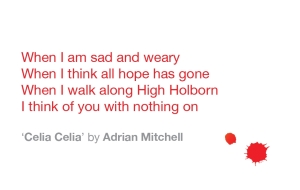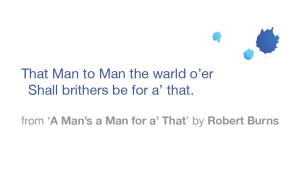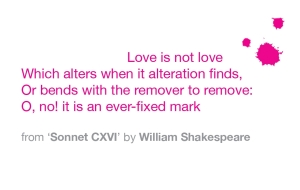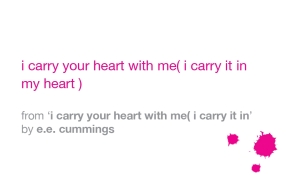Poetry Pocketcards – In Detail Still Monday, 22 February 2010
Posted by edincityoflit in Stories.Tags: Adrian Mitchell, e e cummings, Edward Lear, James Hogg, Lewis Carroll, Robert Burns, Rudyard Kipling, T S Eliot, W B Yeats, William Shakespeare
trackback
Here is your second batch of poetry pocketcards:
 William Butler Yeats was an Irish poet and dramatist, and one of the foremost figures of 20th century literature. In 1923, he was the first Irishman to be awarded the Nobel Prize in Literature.
William Butler Yeats was an Irish poet and dramatist, and one of the foremost figures of 20th century literature. In 1923, he was the first Irishman to be awarded the Nobel Prize in Literature.
Edward Estlin Cummings was an American poet, painter, essayist, author, and playwright. His body of work encompasses approximately 2,900 poems, two autobiographical novels, four plays and several essays, as well as numerous drawings and paintings.
Charles Lutwidge Dodgson, better known by the pseudonym Lewis Carroll, was an English author, mathematician, logician, Anglican deacon and a photographer. His most famous writings are Alice’s Adventures in Wonderland and its sequel Through the Looking-Glass, as well as the poems “The Hunting of the Snark” and “Jabberwocky”, all examples of the genre of literary nonsense.
 Rudyard Kipling was a British author and poet, born in Bombay in 1865. His children’s books are enduring classics of children’s literature, and his poetry exceptionally popular. In 1907, he was the first English language writer to be awarded the Nobel Prize in Literature, and to date he remains its youngest recipient. He declined both the Poet Laureateship and a knighthood.
Rudyard Kipling was a British author and poet, born in Bombay in 1865. His children’s books are enduring classics of children’s literature, and his poetry exceptionally popular. In 1907, he was the first English language writer to be awarded the Nobel Prize in Literature, and to date he remains its youngest recipient. He declined both the Poet Laureateship and a knighthood.
 James Hogg was born near Ettrick in Scotland in 1770 and is often referred to as ‘The Ettrick Shepherd’. His employer introduced him to Sir Walter Scott, who asked him to help with a publication entitled The Minstrelsy of the Scottish Border. Eventually becoming a well-known literary figure in Edinburgh, he was recruited by William Blackwood for Blackwood’s Magazine, and went on to publish The Private Memoirs and Confessions of A Justified Sinner, now his most widely recognised work, and cited as an influential work by many modern Scottish writers.
James Hogg was born near Ettrick in Scotland in 1770 and is often referred to as ‘The Ettrick Shepherd’. His employer introduced him to Sir Walter Scott, who asked him to help with a publication entitled The Minstrelsy of the Scottish Border. Eventually becoming a well-known literary figure in Edinburgh, he was recruited by William Blackwood for Blackwood’s Magazine, and went on to publish The Private Memoirs and Confessions of A Justified Sinner, now his most widely recognised work, and cited as an influential work by many modern Scottish writers.
 Edward Lear was an English artist, illustrator, author, and poet, renowned today primarily for his literary nonsense, in poetry and prose, and especially his limericks, a form that he popularised.
Edward Lear was an English artist, illustrator, author, and poet, renowned today primarily for his literary nonsense, in poetry and prose, and especially his limericks, a form that he popularised.
 Adrian Mitchell was a London-born poet, novelist and playwright. A former journalist, he became a noted figure on the British anti-authoritarian Left and for almost half a century he was the foremost poet of the country’s anti-Bomb movement. He died in 2008, and is survived by his wife, Celia, and five children.
Adrian Mitchell was a London-born poet, novelist and playwright. A former journalist, he became a noted figure on the British anti-authoritarian Left and for almost half a century he was the foremost poet of the country’s anti-Bomb movement. He died in 2008, and is survived by his wife, Celia, and five children.
 Robert Burns was born in Ayrshire in 1759 and while he contemplated emigration to the West Indies, his collection of Poems, Chiefly in the Scottish Dialect was published by John Wilson of Kilmarnock, and its unexpected success led him to reconsider. Instead, he moved to Edinburgh where he was fêted. During the last years of his life, Burns wrote some of his great poetic masterpieces, including ‘Tam o’Shanter’ and ‘A red, red rose’. He died in aged 37, of heart disease.
Robert Burns was born in Ayrshire in 1759 and while he contemplated emigration to the West Indies, his collection of Poems, Chiefly in the Scottish Dialect was published by John Wilson of Kilmarnock, and its unexpected success led him to reconsider. Instead, he moved to Edinburgh where he was fêted. During the last years of his life, Burns wrote some of his great poetic masterpieces, including ‘Tam o’Shanter’ and ‘A red, red rose’. He died in aged 37, of heart disease.
Every year, on 25 January, the anniversary of his birth, Scots celebrate Burns Night with a Burns Supper, a traditional celebration consisting of speeches, music and song dedicated to the poet’s life and work.
 Thomas Stearns Eliot was an American-born English poet, playwright, and literary critic. His first notable publication, The Love Song of J. Alfred Prufrock, is regarded as a masterpiece of the modernist movement. It was followed by some of the best-known poems in the English language, including The Waste Land, Old Possum’s Book of Practical Cats, and Four Quartets. He is also known for his seven plays, particularly Murder in the Cathedral and The Cocktail Party. He was awarded the Nobel Prize in Literature and the Order of Merit in 1948.
Thomas Stearns Eliot was an American-born English poet, playwright, and literary critic. His first notable publication, The Love Song of J. Alfred Prufrock, is regarded as a masterpiece of the modernist movement. It was followed by some of the best-known poems in the English language, including The Waste Land, Old Possum’s Book of Practical Cats, and Four Quartets. He is also known for his seven plays, particularly Murder in the Cathedral and The Cocktail Party. He was awarded the Nobel Prize in Literature and the Order of Merit in 1948.
 William Shakespeare was an English poet and playwright, widely regarded as the greatest writer in the English language and the world’s pre-eminent dramatist. He is often called England’s national poet and the “Bard of Avon”.
William Shakespeare was an English poet and playwright, widely regarded as the greatest writer in the English language and the world’s pre-eminent dramatist. He is often called England’s national poet and the “Bard of Avon”.
Over To You
So, there you have them – our poetry pocketcards. Which do you like best?









[…] Read on – more poets and pocketcards >>> […]